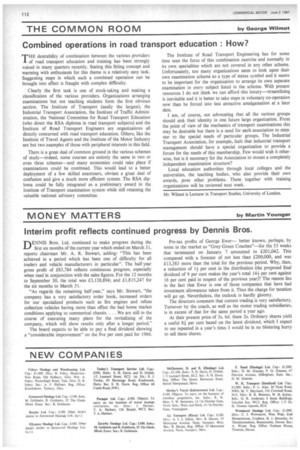MONEY MATTERS by Martin Younger
Page 114

If you've noticed an error in this article please click here to report it so we can fix it.
Interim profit reflects continued progress by Dennis Bros.
DENNIS Bros. Ltd. continued to make progress during the first six months of the current year which ended on March 31, reports chairman Mr. A. R. Stewart, adding: "This has been achieved in a period which has been one of difficulty for all traders and vehicle manufacturers in particular". The half-year gross profit of £83,784 reflects continuous progress, especially when read in conjunction with the sales figures. For the 12 months to September 30, the total was £3,138,894; and £1,815,247 for the six months to March 31.
"As regards the remaining half-year," says Mr. Stewart, "the company has a very satisfactory order book, increased orders for our specialized products such as fire engines and refuse collection vehicles having more than offset the bad home market conditions applying to commerical chassis. . . We are still in the course of executing many plans for the revitalizing of the company, which will show results only after a longer period."
The board expects to be 'able to pay a final dividend showing a "considerable improvement" on the five per cent paid for 1966. Pre-tax profits of George Ewer— better known, perhaps, by some in the market as "Grey-Green Coaches"—for the 53 weeks that terminated on January 7 amounted to £201,042. This compared with, a forecast of not less than £200,000, and was £13,383 more than the total for the previous period. Why, then, a reduction of 1-1per cent in 'the distribution (the proposed final dividend of 9 per cent makes the year's total 14+ per cent against 16 per cent paid in respect of the previous year)? The reason lies in the fact that Ewer is one of those companies that have had investment allowances taken from it. Thus the charge for taxation will go up. Nevertheless, the outlook is hardly gloomy.
The directors comment that current trading is very satisfactory. Turnover by the coach, as well as the motor trading subsidiaries, is in excess of that for the same period a year ago.
At their present price of 3s. 6d. these 2s. Ordinary shares yield a useful 81 per cent based on the latest dividend, which I expect to see repeated in a year's time: I would be in no blistering hurry to sell these shares.




























































































































































